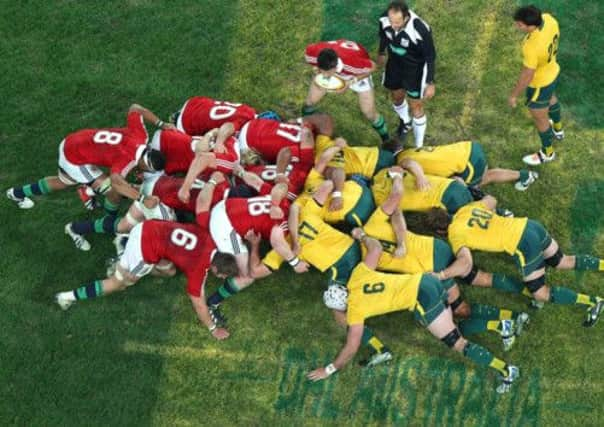Allan Massie: Scrums sum up dull Lions series


The transformation in their game dated from the replacement of Mike Phillips by Conor Murray, and the first try was made possible by Murray’s splendid pass which put Jonny Sexton in space and on the right running line.
Nevertheless the swagger in the closing stages shouldn’t obscure the fact that for all but the last quarter of the last match, the Lions played with a pitiful lack of ambition. As for those who maintain that the result justified Warren Gatland’s decision to drop Brian O’Driscoll, one pillar of the club game in the Borders remarked to me that they had done well enough without him, but might have done better still with him on the field. Jonathan Davies had a good game in the No 13 jersey, but he did nothing that one wouldn’t have expected O’Driscoll to do equally well. In any case, there is so much talk about “the romance of the Lions”, that there ought to be a place for sentiment.
Advertisement
Hide AdAdvertisement
Hide AdThere were elements of the match which were profoundly unsatisfactory. In the first half the Lions kicked four penalties, all awarded for scrum offences. Actually, the chief offence was that the Australian scrum was less powerful than the Lions’ one, and whether this should cost a team three points is doubtful. Some praised Romain Poite as “a good referee of the scrum”. Really? If he had applied the Laws as he is supposed to do, these scrums would have resulted in a free kick for the Wallabies rather than a penalty for the Lions because Mike Phillips wasn’t even pretending to put the ball in straight. One can’t blame him of course. All scrum-halves cheat at the scrum because, except for the rare occasions when the referee has a fit of conscience, they are always allowed to do so. If anybody can explain to me why referees take note of squint throws into the line-out and ignore squint feeds at the scrum, I’ll be grateful. I don’t, however, expect an explanation from the IRB.
The scrum penalty awarded to the Lions when Australia had got back to 16-19 was especially bizarre. The ball was in the Australian scrum, which was, admittedly, again going backwards fast, with heads in both front rows popping up. Meanwhile, the Lions blindside flanker Dan Lydiate had detached himself from the scrum before the ball was out, which is illegal; he was then in an offside position at the rear of the Australian scrum, which is illegal. Result: penalty to the Lions. If John McEnroe had been the Wallabies’ scrum-half, he would surely have questioned Monsieur Poite’s ability to be serious.
Some years ago the IRB, in their wisdom, amended the offside law in relation to the set scrum, requiring flankers to remain bound, and backs, except for the scrum-half, to be five metres behind the rearmost foot, till the ball was out. The intention was clear: the amendment would mean that backs would receive good ball in a bit of space. Time spent drafting this law has evidently been time wasted. At the top level of the game the ball is almost never heeled from an advancing scrum, because they are playing for a penalty. This is grotesque. In effect, if you have a weaker scrum, any knock-on or forward pass in your own half is likely to cost you three points because a penalty will be awarded at the subsequent scrum.
Some say we need a thorough revision of the scrum laws, and they may well be right. Yet it may be that the present laws would work well enough if they were all applied, the most important of these being that which requires the ball to be inserted straight. Perhaps the most interesting experiment would be to make it clear that any referee who doesn’t apply this law consistently would be suspended. Players who repeatedly break laws get a yellow or red card. Why shouldn’t a referee who repeatedly fails to apply an important law be punished likewise?
There are many laws where interpretation is difficult. One may sympathise with referees’ difficulty in policing the breakdown, but it is not difficult to see when a ball is put into the scrum squint. Indeed, this is surely one of the easiest of all laws to apply. Yet it is the one which is almost invariably ignored. Why?
That’s enough scrum talk, with apologies to regular readers of this column. I promise to try to keep off the subject, at least till the first autumn internationals.
Leigh Halfpenny was deservedly named as the Lions’ Player of the Series, and not only on account of his goal-kicking. I can’t recall seeing a full-back play better or with such consistency. His positioning and fielding of kicks were exceptional, while in the last 20 minutes when the Lions decided to play rugby, his speed and skill in attack were equally memorable. As for the scorer of the try of the series, my nomination would go to James O’Connor, whose dancing feet took him through a packed Lions defence. It’s pleasing too that neither Halfpenny nor O’Connor is a man-mountain.